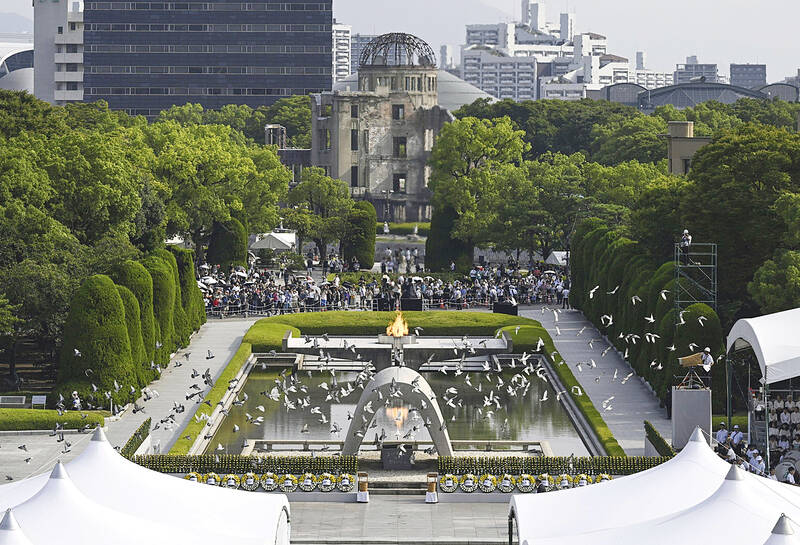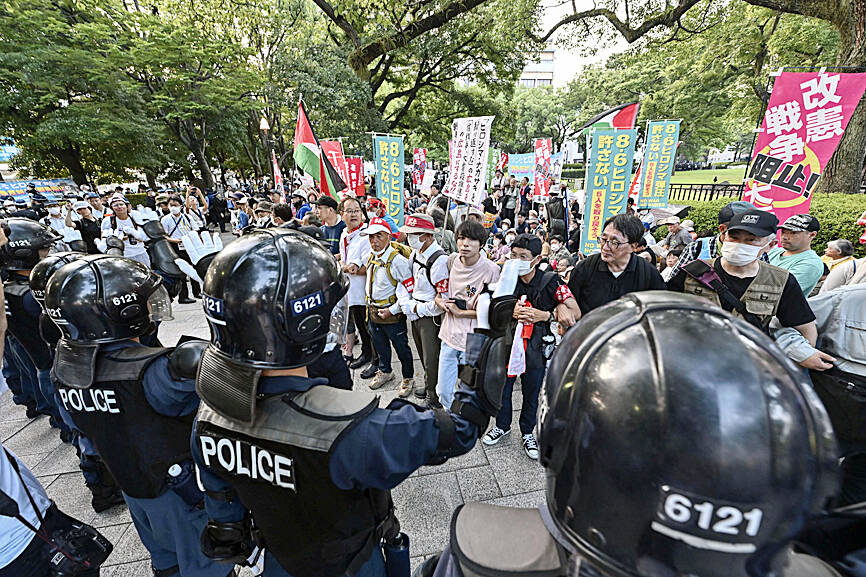Hiroshima officials yesterday urged world leaders to stop relying on nuclear weapons as deterrence and take immediate action toward abolishment — not as an ideal, but to remove the risk of a nuclear war amid conflicts in Ukraine and the Middle East and rising tensions in East Asia.
They commented as Hiroshima remembered its atomic bombing 79 years ago at the end of World War II.
The memorial comes days after Japan and the US reaffirmed Washington’s commitment to “extended deterrence,” which includes atomic weapons, to protect its Asian ally.

Photo: Kyodo News via AP
That is a shift from Japan’s past reluctance to openly discuss the sensitive issue as the world’s only country to have suffered atomic attacks.
Hiroshima Prefecture Governor Hidehiko Yuzaki said that nuclear-armed nations and supporters of atomic deterrence “deliberately ignore ... the fact that once people invented a weapon, they used it without exception.”
“As long as nuclear weapons exist, they will surely be used again someday,” Yuzaki said in his address at the Hiroshima Peace Memorial Park.

Photo: Kyodo via Reuters
“Nuclear weapons abolition is not an ideal to achieve far in the future. Instead, it is a pressing and real issue that we should desperately engage in at this moment since nuclear problems involve an imminent risk to human survival,” he said.
Hiroshima Mayor Kazumi Matsui said Russia’s war on Ukraine and the worsening conflict between Israel and Palestinians are “deepening distrust and fear among nations” and reinforcing a view that use of force in settling conflict is unavoidable.
The atomic bomb dropped by the US on Hiroshima on Aug. 6, 1945, destroyed the city, killing 140,000 people. A second bomb dropped three days later on Nagasaki killed 70,000 more. Japan surrendered on Aug. 15, ending World War II and Japan’s nearly half-century aggression in Asia.
About 50,000 people at the ceremony observed a minute of silence with the sound of a peace bell at 8:15am, the time when a US B-29 dropped the bomb on the city. Hundreds of white doves, considered symbols of peace, were released.
Japanese Prime Minister Fumio Kishida, who attended the ceremony, said global conflicts and divided views over approaches to nuclear disarmament make achieving that goal “all the more challenging,” but pledged to do his utmost in pursuing “realistic and practical measures” to build momentum within the international community.
His critics say it is a hollow promise, because Japan relies on the US nuclear umbrella for protection and has been rapidly expanding its military.
Japan, the US and other regional allies have been stepping up security cooperation in response to a more assertive China and the growing nuclear and missile threats from North Korea.
Japan has sought stronger US protection by its nuclear capability.
Many survivors of the bombings have lasting injuries and illnesses resulting from the explosions and radiation exposure and have faced discrimination in Japan.
As of March, 106,823 survivors — 6,824 fewer than a year ago, and now with an average age of 85.58 — are certified as eligible for government medical support, the Japanese Health and Welfare Ministry said.
Many others, including those who say they were victims of the radioactive “black rain” that fell outside the initially designated areas of Hiroshima and Nagasaki, are still without support.
Hiroshima officials called on Kishida’s government to do more to provide support and address their wishes.
The aging survivors, known as “hibakusha,” continue to push for a nuclear arms ban as they desperately campaign to have their effort kept alive by younger generations.

The Central Election Commission has amended election and recall regulations to require elected office candidates to provide proof that they have no Chinese citizenship, a Cabinet report said. The commission on Oct. 29 last year revised the Measures for the Permission of Family-based Residence, Long-term Residence and Settlement of People from the Mainland Area in the Taiwan Area (大陸地區人民在台灣地區依親居留長期居留或定居許可辦法), the Executive Yuan said in a report it submitted to the legislature for review. The revision requires Chinese citizens applying for permanent residency to submit notarial documents showing that they have lost their Chinese household record and have renounced — or have never

A magnitude 5.6 earthquake struck off the coast of Yilan County at 12:37pm today, with clear shaking felt across much of northern Taiwan. There were no immediate reports of damage. The epicenter of the quake was 16.9km east-southeast of Yilan County Hall offshore at a depth of 66.8km, Central Weather Administration (CWA) data showed. The maximum intensity registered at a 4 in Yilan County’s Nanao Township (南澳) on Taiwan’s seven-tier scale. Other parts of Yilan, as well as certain areas of Hualien County, Taipei, New Taipei City, Taoyuan, Hsinchu County, Taichung and Miaoli County, recorded intensities of 3. Residents of Yilan County and Taipei received

Taiwan has secured another breakthrough in fruit exports, with jujubes, dragon fruit and lychees approved for shipment to the EU, the Ministry of Agriculture said yesterday. The Animal and Plant Health Inspection Agency on Thursday received formal notification of the approval from the EU, the ministry said, adding that the decision was expected to expand Taiwanese fruit producers’ access to high-end European markets. Taiwan exported 126 tonnes of lychees last year, valued at US$1.48 million, with Japan accounting for 102 tonnes. Other export destinations included New Zealand, Hong Kong, the US and Australia, ministry data showed. Jujube exports totaled 103 tonnes, valued at

BIG SPENDERS: Foreign investors bought the most Taiwan equities since 2005, signaling confidence that an AI boom would continue to benefit chipmakers Taiwan Semiconductor Manufacturing Co’s (TSMC, 台積電) market capitalization swelled to US$2 trillion for the first time following a 4.25 percent rally in its American depositary receipts (ADR) overnight, putting the world’s biggest contract chipmaker sixth on the list of the world’s biggest companies by market capitalization, just behind Amazon.com Inc. The site CompaniesMarketcap.com ranked TSMC ahead of Saudi Aramco and Meta Platforms Inc. The Taiwanese company’s ADRs on Tuesday surged to US$385.75 on the New York Stock Exchange, as strong demand for artificial intelligence (AI) applications led to chip supply constraints and boost revenue growth to record-breaking levels. Each TSMC ADR represents